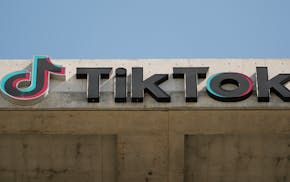Minneapolis attorney Jerry Blackwell has been on his legal mission for a long time.
The 50-year-old native of Kannapolis, N.C., said he wanted to be a lawyer starting in the second grade. He was the first of six kids in his family to attend college -- which he did on a merit scholarship -- and he zeroed in on the Minneapolis market while he was still in law school.
Blackwell wanted to do big important cases and that was right up the alley of the firm Robins, Kaplan, Miller & Ciresi, which in the mid-1980s represented the government of India in its lawsuit over the infamous Union Carbide gas leak that killed thousands.
But after 10 years, Blackwell wanted to go out on his own and not wait for the seniority that would be necessary at a large firm to get assigned the big cases. Today his client list includes the likes of 3M, General Mills, Cargill, IBM and Shell Oil. Blackwell talked recently about his career and the art of presenting complex cases to everyday jurors.
QHow did a North Carolina born-and-bred native come to Minnesota?
AI read an article in the New York Times about the Bhopal gas explosion and the government of India was being represented by the Robins [Kaplan, Miller & Ciresi] law firm. I had a friend who had clerked there and I talked to her and got together a cover letter and rsum and sent it off. I'd never been to Minnesota. I came in for an interview and by November 1986 I had a job offer. After I graduated the next spring, I came here and went to work on the Bhopal case. I thought I might stay here two years at best.
QWhy did you start your own practice?
AImpatience. I was at Robins from September 1987 until August 1997. I was a partner at age 31. I wanted to find out what I could do on my own. There were a lot of redwoods at Robins -- tall trees that took up a lot of the sunlight -- and I wanted to be a player. That can be difficult at a larger, institutional law firm. It was important for me to get in the first chair [at the lawyer's courtroom table]. If it didn't work out, I could always go back to an institutional firm. I've been a feral cat ever since.
QTell me about Blackwell Burke.
AWe're 16 lawyers. We do litigation for Fortune 500 companies. We are trial counsel in complex cases usually involving large exposure by the defendant. We've done several class actions for General Mills in the food arena over labeling and health claims. We're set for trial in September in California in a class-action case over Yo-Plus in yogurt. We represent ConAgra over its Hebrew National hot dogs and their kosher designation. The plaintiffs say the hot dogs are not kosher enough. The Wal-Mart wage case was tried to the court [by a judge without a jury]. It was my first foray into labor law. I think the result was good for everyone. [Minnesota Wal-Mart employees got $54 million in a wages-and-hours lawsuit, but Wal-Mart avoided up to $2 billion in punitive damages.]
QHow do you market Blackwell Burke?
AWord of mouth is the chief method. When all is said and done, lawyers willing to step into the breach of a case are hard to come by. Even big firms have few trial lawyers. If you have a reputation for going into court and talking to the jury, that is a good calling card. I see a sea change in the way companies staff for significant cases. They use a virtual law firm model by taking the best in class from different firms for different functions. That works fairly well if you have lawyers who work well with others.
QHow do you take complex cases and present them to a jury of lay people?
AThe biggest challenge for me is finding a way to best represent a case that is understandable to the jury. Have I done the best job representing my client's case? Every case is one of four things -- lying, cheating, stealing or hurting. I don't care how complicated the case is, fundamentally it is one of those four things. We have to give the jurors buckets to put the facts in. A picture is worth 1,000 words and the jury would rather see 1,000 pictures than hear your 1,000 words.
QDo you resent being called a hired gun?
AI'm a zealous advocate. Lawyers are retained to be advocates. If that makes them hired guns, then we all are. I've turned down cases because I didn't agree with the story or I didn't like the client.
David Phelps • 612-673-7269
Biden administration moves to make conservation an equal to industry on US lands
Stock market today: Wall Street limps toward its longest weekly losing streak since September
